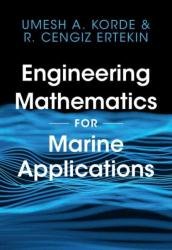Engineering Mathematics for Marine Applications
- Добавил: literator
- Дата: 16-05-2023, 05:25
- Комментариев: 0
 Название: Engineering Mathematics for Marine Applications
Название: Engineering Mathematics for Marine ApplicationsАвтор: Umesh A. Korde, R. Cengiz Ertekin
Издательство: Cambridge University Press
Год: 2023
Страниц: 428
Язык: английский
Формат: pdf (true)
Размер: 20.7 MB
Gaining expertise in marine floating systems typically requires access to multiple resources to obtain the knowledge required, but this book fills the long-felt need for a single cohesive source that brings together the mathematical methods and dynamic analysis techniques required for a meaningful analysis, primarily, of large and small bodies in oceans. You will be introduced to fundamentals such as vector calculus, Fourier analysis, and ordinary and partial differential equations. Then you'll be taken through dimensional analysis of marine systems, viscous and inviscid flow around structures surface waves, and floating bodies in waves. Real-life applications are discussed and end of chapter problems help ensure full understanding. Students and practicing engineers will find this an invaluable resource for developing problem solving and design skills in a challenging ocean environment through the use of engineering mathematics.
Mathematics allows us to describe and interpret the myriad intricacies of nature. Engineers tend to use mathematics to help them design structures and systems that must work with, survive, and sometimes utilize the forces of nature. As we look ahead to an era in which oceans and their effect on life on land command ever greater attention, we might expect that more and more engineers of the future will require some understanding of how engineered structures and systems respond to the forces of the ocean. This may, therefore, be a good time to pause and reflect on the works of brilliant mathematicians and ocean engineers who, over the last three centuries, have put together a rich array of methods and techniques, without which the development of offshore oil, ocean energy, and ocean exploration technologies would have been slower, more painful, and more expensive.
This book is a record of our attempt to assemble in one place the mathematical methods that would serve an engineer well when tackling problems that involve bodies that have to withstand and perhaps exploit the harsh environment on and close to the ocean surface. Forces in the ocean are time and location dependent, so we begin with a study of vectors and their rates of change with time and space, and we learn about surfaces, volumes, and fields so that we could conveniently and compactly describe them and relate them to each other through known laws of physics (such as conservation mass, conservation of momentum, conservation of energy, viscous dissipation and energy loss, etc.). We review principles of system dynamics, so that we could relate the rates of change of our field variables to other variables and any external forces, particularly as and when they impact an engineered structure in the ocean. The review of vector calculus, complex algebra, and Fourier analysis provides the foundation for material on ordinary and partial differential equations. While our goal has been to frame these discussions in the context of marine, and/or in-water applications, we have also been mindful of the more traditional mechanical engineering treatments of diffusion, conduction, and wave propagation on/over solids. A brief treatment of analytical dynamics is also included, given the importance of variational calculus in engineering optimization, control, finite-element analysis, etc.
Contents:
Скачать Engineering Mathematics for Marine Applications
Внимание
Уважаемый посетитель, Вы зашли на сайт как незарегистрированный пользователь.
Мы рекомендуем Вам зарегистрироваться либо войти на сайт под своим именем.
Уважаемый посетитель, Вы зашли на сайт как незарегистрированный пользователь.
Мы рекомендуем Вам зарегистрироваться либо войти на сайт под своим именем.
Информация
Посетители, находящиеся в группе Гости, не могут оставлять комментарии к данной публикации.
Посетители, находящиеся в группе Гости, не могут оставлять комментарии к данной публикации.

